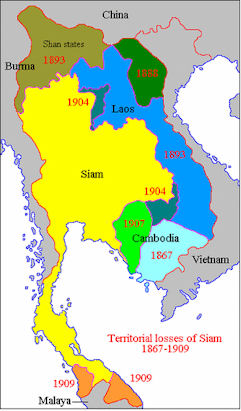

Zitierweise / cite as:
Payer, Alois <1944 - >: Chronik Thailands = กาลานุกรมสยามประเทศไทย. -- Chronik B. E. 2462 / 1919-04 - 1920-03 (Rama VI.). -- Fassung vom 2017-01-12. -- URL: http://www.payer.de/thailandchronik/chronik1919-20.htm
Erstmals publiziert: 2013-10-14
Überarbeitungen: 2017-01-12 [Ergänzungen] ; 2016-05-31 [Ergänzungen] ; 2016-03-18 [Ergänzungen] ; 2016-02-25 [Ergänzungen] ; 2016-02-13 [Ergänzungen] ; 2016-01-05 [Ergänzungen] ; 2015-12-28 [Ergänzungen] ; 2015-12-04 [Ergänzungen] ; 2015-10-16 [Ergänzungen] ; 2015-09-18 [Ergänzungen] ; 2015-09-02 [Ergänzungen] ; 2015-08-20 [Ergänzungen] ; 2015-07-05 [Ergänzungen] ; 2015-06-23 [Ergänzungen] ; 2015-05-13 [Ergänzungen] ; 2015-04-28 [Ergänzungen] ; 2015-04-03 [Ergänzungen] ; 2014-12-31 [Ergänzungen] ; 2014-11-26 [Ergänzungen] ; 2014-11-16 [Ergänzungen] ; 2014-04-16 [Ergänzungen] ; 2014-03-24 [Ergänzungen] ; 2014-03-05 [Ergänzungen] ; 2014-02-22 [Ergänzungen] ; 2013-12-18 [Ergänzungen] ; 2013-12-18 [Ergänzungen] ; 2013-12-05 [Ergänzungen] ; 2013-11-23 [Ergänzungen] ; 2013-11-13 [Ergänzungen]
©opyright: Dieser Text steht der
Allgemeinheit zur Verfügung. Eine Verwertung in Publikationen, die über übliche
Zitate hinausgeht, bedarf der ausdrücklichen Genehmigung des Herausgebers.
Dieser Text ist Teil der Abteilung
Thailand von
Tüpfli's Global Village Library
ช้างตายทั้งตัวเอาใบบัวปิดไม่มิด
|
Gewidmet meiner lieben Frau Margarete Payer die seit unserem ersten Besuch in Thailand 1974 mit mir die Liebe zu den und die Sorge um die Bewohner Thailands teilt. |
|
Bei thailändischen Statistiken muss man mit allen Fehlerquellen rechnen, die in folgendem Werk beschrieben sind:
Die Statistikdiagramme geben also meistens eher qualitative als korrekte quantitative Beziehungen wieder.
|
1919
Abb.: Frauen, Nakhon Phanom (นครพนม), 1919
Abb.: Lage von Nakhon Phanom (นครพนม)
[Bildquelle: CIA. -- Public domain]
ca. 1919
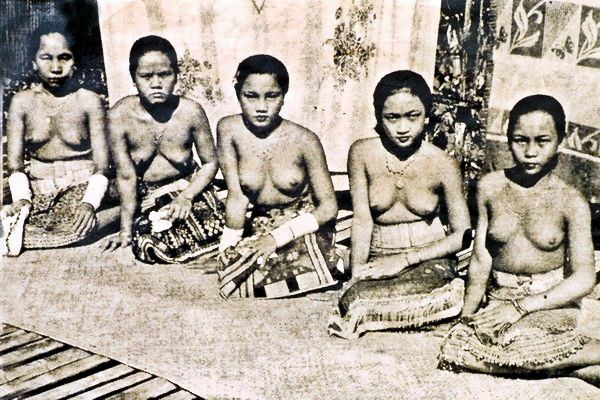
Abb.: Frauen, Provinz Chiang Rai (เชียงราย), ca. 1919
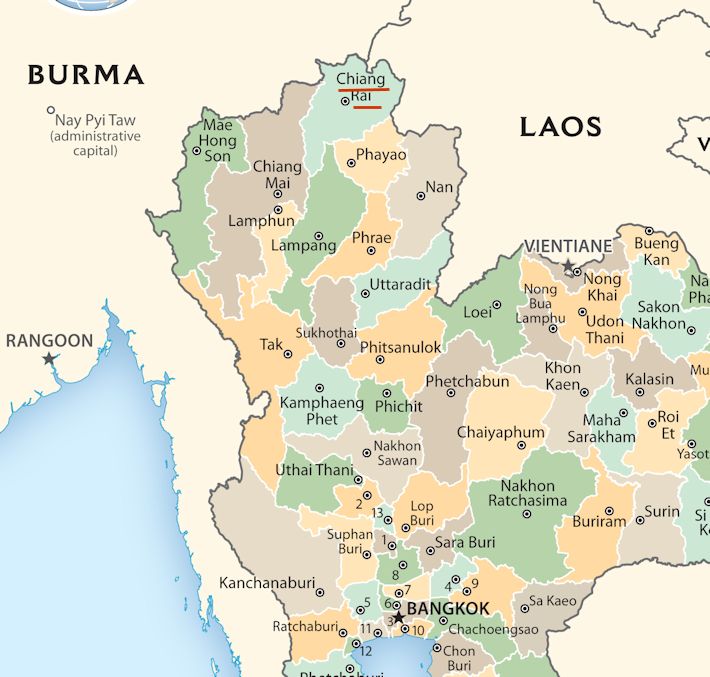
Abb.: Lage der Provinz Chiang Rai (เชียงราย)
[Bildquelel: CIA. -- Public domain]
1919
Abb.: Mekong-Schiffe (แม่น้ำโขง / ແມ່ນ້ຳຂອງ) bei Chiang Rai (เชียงราย), 1919
Abb.: Mekong (แม่น้ำโขง / ແມ່ນ້ຳຂອງ) bei Chiang Rai (เชียงราย)
[Bildquelle: OpenStreetMap. -- Creative Commons Lizenz (Namensnennung, share alike)]
1919
Abb.: Drachen- und Modellflugwettbewerb, Bangkok, 1919
1919
Das angeblich freie Schulsystem lässt sich nur finanzieren, indem die Eltern Schulgeld zahlen.
1919/1920
Extreme Trockenheit
Abb.: Durch Hochwasser bzw. Trockenheit geschädigte Erntefläche in Zentralthailand 1907 - 1941 (in Prozenz)
[Datenquelle: Feeny, David <1948 - >: The political economy of productivity : Thai agricultural development 1880 - 1975. -- Vancouver : University of British Columbia Press, 1982. -- (Asian studies monographs ; 3). -- Zugl.: Diss. Univ. of Wisconsin-Madison. -- 238 S. ; 24 cm. -- S. 70]
1919
Zensus
Abb.: Einwohner gemäß Zensus in Mio., 1911 - 1947
[Datenquelle: Ingram (1971), S. 46]
1919
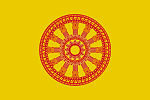
Es erscheint:
Vajirañāṇavarorasa [วชิรญาณวโรรส] <1880 - 1921>: The Triumph of right : a special allocution by His Holiness Prince Vajirañāna / transl. by one of his disciples. -- Bangkok : Bangkok Daily Mail, [1919]. -- 39 S. ; 18 cm.
"Ein Traktat mit dem Titel "Triumph of Right", das ebenfalls dem König gewidmet war, lobte am Ende des Ersten Weltkrieges die Entscheidung von Wachirawut, an der Seite der Alliierten zu kämpfen, und er vergleicht die Mittelmächte mit dem Prinzip des Schlechten: "Right and Wrong are mutually antagonistic, as white is to black, and have always been at war from time immemorial; but the luck of the world remains ever good, so that right has always triumphed, or if it has sometimes appeared to be overcome, yet has it been only so temporarily, and always ultimately emerged triumphant".
Prince Vajiranana: The Triumph of Right, Bangkok 1919, S. 18. Im Vorwort dieses Traktats heißt es u.a. auch, dass viele Kopien davon nach Britisch-Birma gesandt worden waren."
[Quelle: Skrobanek, Walter <1941 - 2006>: Buddhistische Politik in Thailand : mit besonderer Berücksichtigung des heterodoxen Messianismus. -- Wiesbaden : Steiner, 1976. -- 315 S. ; 24 cm. -- (Beiträge zur Südasienforschung ; 23). -- ISBN 3-515-02390-9. -- Zugl.: Heidelberg, Univ., Diss., 1972. -- S. 60, Anm. 2. -- Mit Erlaubnis des inzwischen verstorbenen Autors]
1919/1920
Es erscheint
ดำรงราชานุภาพ <สมเด็จพระเจ้าบรมวงศ์เธอ กรมพระยา> [Damrong Rajanubhab] <1862 - 1943>: ด่านานเรื่องเลิกหวยและบ่อนนบี้ยในกรุงสยาม
[Geschichte der Abschaffung der chinesischen Lotterie und der chinesischen Spielhöllen in Siam). -- Bangkok : Sophon, [1919]. -- 92 S. -- (ประชุมพงศาวดาร ; ภาคที่ ๑๗)
“Lottery tickets and gambling and taxes collected on them have both demerits and merits. On the one hand, they amount to commercialization of wickedness, while on the other, they have some good points including the fact that they serve as an excuse for collecting sweeping taxes from the people (their comprehensiveness is not necessarily good). If tax yield is the object in view, there is no other tax as convenient to collect as those on lottery and fan-tan [番攤], since, without the Government’s having to set rates and collect them in a way which may lead to complaints, people are willing to find money to pay them. Even if they go bankrupt and have to sell their belongings, dwellings and even themselves, their willingness to pay such taxes is still there. Nobody complains of the existence of gambling dens and the lottery houses. At worst, when they feel depressed after heavy losses in gambling, they blame their misbehaviour or misfortune but never the gambling dens or the lottery house. That is all to be said for lottery and gambling dens. Much can, however, be said against them. Briefly, they reduce people to poverty, and in this situation they cannot carry on their own affairs or contribute to national progress. Furthermore, lottery and gambling dens foster in the masses an ingrained habit for wickedness.
If we push our consideration further and discuss which of the two is more harmful, it can be seen that the gambling den is bad for the lower classes, since the lower classes are more prepared to visit the den than the higher classes and the higher classes are also unlikely to gamble surreptitiously at home. On the other hand, lottery is more harmful for the higher classes than for the lower ones, since it can be indulged in privately without having to pay a visit to the lottery house. Moreover, the odds are also different. Gambling in a den may entail a total loss of what one takes along while buying lottery tickets may bring about a gradual loss. To use metaphors, a loser in the gambling den is a cholera patient, while the lottery addict is a tuberculosis patient. Of course, both patients are bound to die, but one at a slower rate than the other.
It has never occurred that any person cap amass sufficient wealth from the gambling den or the lottery-house to stand on his own feet. A story has been told of a certain Pra Parsee [พระภาษี] (tax farmer) Lek [เล็ก] who became so rich on account of gambling that he was able to build a monastery. In fact, this was not because he gained anything from the den or the lottery house but rather because, as a farmer for gambling den taxes and other taxes, he became rich enough to build Pawana Pirataram monastery [วัด ภาวนาภิรตาราม] in the Bangkok Noi canal [คลองบางกอกน้อย]. But even if some became rich through gambling, their number would be nothing compared to tens and hundreds of thousands of men who were ruined on account of indulgence in gambling and lottery.”
[Übersetzt in: Prachoom Chomchai [ประชุม โฉมฉาย] <1931 - >: Chulalongkorn the great : a volume of readings edited and translated from Thai texts. -- Tokyo : Centre for East Asian Cultural Studies, 1965. -- 167 S. ; 19 cm. -- (East Asian cultural studies series ; no. 8.). -- S. 73f.]
1919
Bangkok: Chinesen gründen die Rice Merchants Association.
1919
Bangkok: Gründung einer Filiale der Bank of Canton (廣東銀行)
1919

Bangkok: Tan Tiem Sua hält die erste Sabbath School der Siebenten-Tags-Adventisten. 1927 gelingt es, in Korat (โคราช) den ersten Thai zu bekehren. Um Kirchenmitglied zu werden, muss man aufhören, zu rauchen, Betelnuss zu kauen oder Alkohol zu trinken.
1919 - 1921

Richard Seymour ist britischer Envoy Extraordinary and Minister Plenipotentiary
1919

Es erscheint
Pitkin, Wolcott Homer <1881 - >: Siam's case for revision of obsolete treaty obligations, admittedly inapplicable to present conditions. -- [o.O.], 1919. -- 92 S. ; 26 cm. -- "Supplemented by: "Supplement. Treaties and other documents." (236 p. 26 cm.)" ; Pitkin war bis 1917 außenpolitischer Berater Siams.
1919

Es erscheint
Gibbons, Herbert Adams <1880 - 1934>: The new map of Asia (1900-1919). -- New York : Century, 1919. -- 571 S. : Ill. ; 21 cm
Abb.: Einbandtitel
"PARING DOWN SIAM SHORTLY after the entry of Siam into the war against Germany, a member of the Siamese royal family brought me a manuscript to read. It was the graduation thesis he was offering at the Ecole Libre des Sciences Politiques. In it I found:
We hold to national independence above everything else, and will sacrifice everything to that. At no price do we wish to submit ourselves to the political domination or influence of a foreign Power. The Siamese have a developed national conscience, and are worthy to constitute a State. It is evident that if States do not wish reciprocally to recognize the independence of each other, international law will not be able to develop on a solid and durable basis. The natural tendency of this state of things is that certain Powers try to establish domination over weaker States in such a way as to arrogate to themselves the right to dictate the laws which these Powers esteem are necessary for the weaker States.
The excuse is a difference of civilization. But one cannot establish scientific criteria of classification. The criterion adopted and practiced must be that of force, and of physical force alone, without taking into consideration intellectual and moral elements. The error is natural among the large States: for when a big fellow meets a little fellow, his quantitative superiority naturally leads him to the conclusion that he has a qualitative superiority.
When I asked the prince whether these words applied to Germany, and if the feeling expressed in them was the cause of Siam’s decision to enter the war, he smiled the inscrutable smile of the Orient. Ten years at a famous English public school and Oxford, during the formative period of life, had not made his smile more easy to fathom than if he had just come from Bangkok. “Siam, ” he said, “does not know much about Germany. My country entered the war for a very simple reason. Like China, we followed the United States. We wanted to benefit by the application of the American principles for which, and for no others, President Wilson said the American people would fight. If you want to understand why we are asking for a voice at the Peace Conference, just study the history of Siam during the past twenty years. ”
As I did want to understand, I took the prince’s advice.
On the eastern peninsula of southern Asia, Siam is the only country which has preserved its
independence against the encroachments of European eminent domain. Caught in a vise between British and French, what sovereignty they have managed to maintain the Siamese owe to the mutual jealousy of their neighbors. In the Anglo-French agreement of 1904, Siam, pared down to the narrowest possible limits, was left independent because French and British statesmen could not agree as to which should rule at Bangkok. France and Great Britain used the pretext of freeing Burmese, Cambodians, Annamites, and other races from Siamese suzerainty as a means of increasing their own colonial empires. During the last thirty years, Siam has been robbed of portions of her sea-coast as well as of the great valley of the Mekong, leading to China. For the preservation of her sovereignty within the present boundaries, Siam has had to fight hard and consent to the sacrifice of all her borderlands, even when yielding territory meant serious economic handicaps. The history of French and British diplomacy in Siam is a practical exposition of the working of European colonial policy in Asia. Never once have considerations of right and justice entered into the minds of the statesmen and diplomats, the generals and admirals, who bullied Siam. The criterion adopted and practised has been that of force, of physical force alone.[...]
French policy toward Siam has had the opposite effect to that which it was intended to have. The French thought they were extending their influence in the peninsula, and making a greater Indo-China. They could afford to trample upon Siam’s feelings and ignore Siam’s rights. But the Siamese were rendered bitter enemies instead of being cultivated as useful friends for the future. Extension of her colonial dominion at the expense of Siam will mean one day for France the necessity of getting out of Indo-China altogether. If she does not go without resistance, the Siamese will help in putting her out. It might have been otherwise.
As British methods have been different, the case of the British is a little different. And Siam owes much of her present prosperity to the loyal and disinterested aid of Britishers. However, when the moment comes for Asiatic races to attempt to get rid of European eminent domain, the Siamese will be to all Europeans, friends and foes, what they have been during the past two years to the Germans. The criterion will be once more that of “force, and of physical force alone. ”"
[a.a.O., S. 75 - 94]
1919 - 1921 ; 1923 - 1938

Von der Rockefeller Foundation finanziert, baut der US-Mediziner Dr. Aller Gustin Ellis (1868 -1953) am Siriraj Hospital (ศิริราชพยาบาล) eine Pathologie-Abteilung auf. Er gilt als Vater der Thai-Pathology
Abb.: Aller Gustin Ellis
[Bildquelle: http://jeffline.jefferson.edu/SML/archives/collections/finding_aids/ellis.html. -- Zugriff am 2015-04-03. -- Fair use]Aus dem Nachruf in der Siriraj Hospital Gazette 1953:
"For nearly twenty years Dr. Ellis held the helm and directed the Medical School, the School of Nursing and the attached Siriraj Hospital through difficult passages and countless obstacles to a stage of perfection far beyond the expectation of even the greatest optimist. His period of office may not have been as long as that of some others, but it was certainly the most fruitful and the most significant. For it was during those years that Siam’s only Medical School metamorphosed from a backward and unknown place into an institution up-to-date in every way and respectable to everybody. In his eulogy delivered before a mass meeting of the faculty members and students of the Faculty of Medicine and Siriraj Hospital on July the fourth, 1953, Dr. Luang Pynpakya Bidyabhed, the ruling Dean, pronounced with conviction that there was no exaggeration in stating that what Dr. Ellis had done for Siriraj ranked second in importance only to the deeds of our great benefactor, His Royal Highness the late Prince Mahidol of Songkla [สมเด็จฯ เจ้าฟ้ามหิดลอดุลยเดช กรมหลวงสงขลานครินทร , 1892 - 1929]. The assembly could only corroborate the Dean’s statement." [Quelle: http://www.sirirajmedj.com/content.php?content_id=2189. -- Zugriff am 2015-04-03]
1919 - 1923
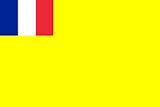
Nguyễn Tất Thành (alias Hồ Chí Minh, 1890 - 1969) lebt in Paris und ist politisch tätig. Er besucht Versammlungen, an denen auch ab 1921 Pridi Phanomyong (ปรีดี พนมยงค์, 1900 - 1983) anwesend ist.
Abb.: Hồ Chí Minh, 1921
[Bildquelle: Wikimedia. -- Public domain]
"From 1919–23, while living in France, Thành began to show an interest in politics, being influenced by his friend and Socialist Party of France (Parti socialiste de France) comrade Marcel Cachin (1869 - 1958). Thành claimed to have arrived in Paris from London in 1917, but the French police only had documents recording his arrival in June 1919. He joined a group of Vietnamese nationalists in Paris whose leaders were Phan Chu Trinh (1872–1926) and Phan Văn Trường. They had been publishing newspaper articles advocating for Vietnamese independence under the pseudonym Nguyễn Ái Quốc ("Nguyễn the Patriot") since before Nguyễn Tất Thành's arrival in Paris in 1919. Following World War I, the group petitioned for recognition of the civil rights of the Vietnamese people in French Indochina to the Western powers at the Versailles peace talks, but was ignored. Citing the language and the spirit of the U.S. Declaration of Independence, they expected U.S. President Woodrow Wilson (1856 – 1924) to help remove the French colonial rule from Vietnam and ensure the formation of a new, nationalist government. Although they were unable to obtain consideration at Versailles, the failure further radicalized Thành, while also making him a symbol of the anti-colonial movement at home in Vietnam. Since Nguyễn Tất Thành was the public face behind the publication of the document (although it was written by Phan Văn Trường), he soon became known as Nguyễn Ái Quốc and first used the name in September during an interview with a Chinese newspaper correspondent. In 1920, Quốc became a representative to the Congress of Tours of the Socialist Party of France, Quốc voted for the Third International and was a founding member of the Parti Communiste Français (FCP). Taking a position in the Colonial Committee of the PCF, he tried to draw his comrades' attention towards people in French colonies including Indochina, but his efforts were often unsuccessful. During this period he began to write journal articles and short stories as well as running his Vietnamese nationalist group. In May 1922, Quốc wrote an article for a French magazine criticizing the use of English words by French sportswriters. The article implored Prime Minister Raymond Poincaré (1860 - 1934) to outlaw such Franglais as le manager, le round and le knock-out. While living in Paris, he reportedly had a relationship with a dressmaker named Marie Brière."
[Quelle: https://en.wikipedia.org/wiki/Ho_Chi_Minh#Political_education_in_France. -- Zugriff am 2015-10-16]
Abb.: Revendications du peuple Annamite : Forderungen von Hồ Chí Minh an die Versailler Friedenskonferenz, 1919Wiedergabe des Texts:
"Revendications du Peuple Annamite
Depuis la victoire des Alliés, tous les peuples assujettis frémissent d’espoir devant la perspective de l’être de droit et de justice qui doit s’ouvrir pour eux en vertu des engagements formels et solennels, pris devant le monde entier par des différentes puissances de l’entente dans la lutte de la Civilisation contre la Barbarie.En attendant que le principe des Nationalités passe du domaine de l’idéal dans celui de la réalité par la reconnaissance effective du droit sacré pour les peuples de disposer d’eux- même, le peuple de l’ancien Empire Annam, aujourd’hui Indo-Chine Française, présente aux Nobles Gouvernements de l’Entente en général et à l’honorable Gouvernement Français en particulier les humbles revendications suivantes:
- Amnistie Générale en faveur de tous les condamnés politiques indigènes
- Réforme de la justice indochinoise par l’octroi aux Indigènes des mêmes garanties judiciaires qu’aux Européens, et la suppression complète et définitive des Tribunaux d’exception qui sont des instruments de terrorisation et d’oppression contre la partie la plus honnête du peuple Annamite.
- Liberté de presse et d’opinion.
- Liberté d’association et de Réunion
- Liberté d’émigration et de voyage à l’étranger,
- Liberté d’enseignement et création dans toutes les provinces des écoles d’enseignements techniques et professionnels à l’usage des indigènes.
- Remplacement du Régime des lois
- Délégation permanente d’indigènes élus auprès du Parlement Français pour le tenir au courant des désidérata indigènes.
Le peuple Annamite, en présentant des revendications ci-dessus formulées, compte sur la justice mondiale des toutes les Puissances et se recommande en particulier à la bienveillance du Noble Peuple Français qui tient son sort entre ses mains et qui, La France étant une République, est censée d’avoir pris sous sa protection. En se réclamant de la protection du Peuple Français, Le Peuple Annamite, bien loin de s’humilier, s’honore au contraire; car il sait que le Peuple Français représente la liberté et la justice, et ne renoncera jamais à son sublime idéal de Fraternité universelle. En conséquence, en écoutant la voix des opprimés, le Peuple Français fera son devoir envers la France et envers l’Humanité.
Pour le Groupe des Patriotes Annamites: Nguyễn Ái Quấc"
1919/1920
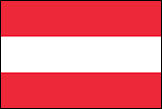
Es erscheint:
Hornbostel, Erich Moritz von <1877 - 1935>: Formanalysen an siamesischen Orchesterstücken. -- In: Archiv für Musikwissenschaft. -- 2 (1919-1920). -- S. 306 - 333
Abb.: a.a.O., S. 313
Abb.: a.a.O., nach S. 320
Abb.: a.a.O., S. 322
Abb.: a.a.O., S. 330
Abb.: a.a.O., S. 332
1919

Japan: es erscheint:
北 一輝 [Kita Ikki] <1883 - 1937>: 日本改造法案大綱. -- "Entwurf für eine Neuorganisation Japans". -- Darin fordert er u.a., dass Japan die Führung in Asien erkämpfen und den Kontinent von westlichen Einflüssen befreien müsse. Das Buch wird verboten, kursiert aber beim Militär.
1919

Der japanische Pharmakologe Ogata Akira (緒方 章, 1887 - 1978) kristallisiert Methamphetamin erstmals in Reinform. 1921 lässt er es patentieren. Methamphetamin wird Ende 20. Jahrhundert als Ya Ba [ยาบ้า] zur Hauptdroge in Thailand werden.
1919
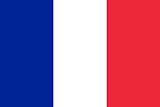
Es erscheint:
Meyer, Roland <1889 - >: Saramani, danseuse khmèr. -- Saigon : Portail, 1919. -- 238 S. : Ill. ; 32 x 24 cm
Abb.: Titelblatt1970 erscheint eine Übersetzung ins Khmer:
Abb.: Einbandtitel
1920
Statistische Daten 1920:
|
1911 - 1966

Anzahl buddhistischer Klöster:
Abb.: Anzahl buddhistischer Klöster 1911 - 1966
[Datenquelle: Bechert (1973), S. 608]
1919
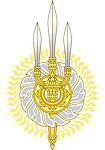
In der Zeitschrift Dusit samit (ดุสิตสมิต) erscheint ein Gedicht von Rama VI. mit folgendem Vers:
When the hour of death draws nigh,
Show you are men of a brave race.
Man leaves but a trace in history,
So valiantly face your foe to die.[Übersetzt in: Vella, Walter F. <1924 - 1980>: Chayo! : King Vajiravudh and the development of Thai nationalism / Walter F. Vella, assisted by Dorothy B. Vella. -- Honolulu : Univ. Press, 1978. -- 347 S. : Ill. ; 25 cm. -- ISBN 0-8248-0493-7. -- S. 88]
1919


Rama VI. schreibt einen antideutschen Artikel: "Wir wollen keine Warane" (ไม่ต้องการเหี้ย). Darin vergleicht er die "Hunnen" mit Waranen (เหี้ย). Siam habe genügend solche Untiere und brauche nicht auch noch Deutsche.
Abb.: Warane, Bangkok, 2013
[Bildquelle: drburtoni. -- http://www.flickr.com/photos/84346589@N00/10605624365. -- Zugriff am 2013-11-11. -- Creative Commons Lizenz (Namensnennung, keine kommerzielle Nutzung, keine Bearbeitung)]
Abb.: Die Entmenschlichung der Deutschen durch Rama VI. ist nicht originell: US-Plakat 1917
[Bildquelle: Wikipedia. -- Public domain]
1919
Rama VI. erlaubt Schauspielerinnen weibliche Rollen zu spielen.
1919
Abb.: Chinesen, Chiang Mai (เชียงใหม่), 1919
1920
Eröffnung des siebenstöckigen Ched Chan Building. Es ist das höchste Gebäude Thailands und hat den ersten Lift Thailands. Im siebten Stock ist ein Luxusbordell; Kosten: 3 - 5 Baht.
1920
Die Tageszeitung Sayam Ratsadorn (สยามราษฎร) bringt als erste Zeitung regelmäßig das Kinoprogramm.
1919-04-06

Erstmals wird der Chakri-Tag (วันจักรี = วันพระบาทสมเด็จพระพุทธยอดฟ้าจุฬาโลกมหาราชและวันที่ระลึกมหาจักรีบรมราชวงศ์) als staatlicher Feiertag gefeiert.
1919-04-11

Siam ist Gründungsmitglied der International Labour Organization (ILO)
1919-04-13
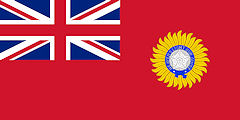
Massaker von Amritsar (ਅੰਮ੍ਰਿਤਸਰ): britische Soldaten ermorden 379 gewaltlose indische Demonstranten und verletzen 1.200.
Abb.: Lage von Amritsar (ਅੰਮ੍ਰਿਤਸਰ)
[Bildquelle: Bartholomew, J. G. <1860 - 1920>: A literary & historical atlas of Asia. -- London, o. J.]
1919-04-27

Albert-Pierre Sarraut (1872 - 1962) spricht in einer Rede erstmals das Problem der Emanzipation Vietnams sowie einer Kolonialverfassung unter französischer Souveränität an.
1919-04-28
Gründung des Völkerbunds. Siam gehört zu den Gründungsmitgliedern.
Abb.: Mitglieder des Völkerbunds
[Bildquelle: Allard Postman / Wikipedia. -- GNU FDLicense]
Abb.: Siams Beitrag zur Finanzierung des Völkerbunds (in Goldfranken) 1919 - 1946
[Datenquelle: Hell, Stefan: Siam and the League of Nations : modernisation, sovereignty and multilateral diplomacy, 1920-1940. -- Bangkok : River Books, 2010. -- 283 S. : Ill. ; 24 cm. -- ISBN 978-974-9863-89-3. -- S. 252]
1919-05

Spekulanten verkaufen große Mengen Reis nach Japan zur Produktion des Resiweins Sake (日本酒). Dadurch steigen die Preise für Reis im Inland. Um solchen Spekulationen zu begegnen ernennt die Regierung einen Reis-Kontrolleur.
Abb.: Geisha (芸者) trinkt Sake / von Tsukioka Yoshitoshi (月岡 芳年, 1839-1892), 1880
[Bildquelel: Wikimedia. -- Public domain]
1919-05-01
340 Weltkriegs-Soldaten der Luftwaffe kehren aus Frankreich zurück. Großer Empfang für die Helden.
1919-06
Die Reisexporte bedrohen den Inlandsmarkt, deshalb wird ein teilweises Exportverbot für Reis erlassen.
1919-06-01
Abb.: 100 Baht, 1919-06-01
1919-06-15
Eine US-Missionarin berichtet aus Petchaburi:
"[June 15th, from Petchaburi]: Cholera is about over here in town. It was rather bad while it lasted. We lost our washer-woman, a good steady middle-aged woman whom we prized ... We hear there is still a good deal of cholera in some of the outlying villages. Of course many, if
not the majority of people, still believe in the spirit agency in the matter. They do not take the precautions advised.You heard of course of the death from cholera of
Nai Joon, your colporteur [a peddler of religious books]. He had come up from Trang to help in the hospital here. He had been ill off and on for some days, seemed to be recovering; but was warned to be very careful of his diet. He got bad again one evening, and died next morning ...Cholera has been very virulent, taking a large proportion of those attacked.... We are glad so many of us have taken the cholera prophylactic serum I brought from Bangkok We have given it to about a hundred [people] Yet much as we fear cholera and plague, the influenza has taken very many more [lives] than the other two. But it is not so awfully sudden."
[Quelle: Stanton, Mary Bulkley <1922 - > ; Bulkley, Edna Bruner <1883 - 1962>: Siam was our home : a narrative memoir of Edna Bruner Bulkley's years in Thailand in the 1900s, with added memories from her children. -- Seattle, WA : Hara, 2003. -- 345 S. : Ill. ; 23 cm. -- ISBN 1-887542-14-0. -- S. 219. -- Faire use]
1919-06-28

Unterzeichnung des Versailler Friedensvertrags zwischen den alliierten und assoziierten Siegermächten des Ersten Weltkriegs und dem Deutschen Reich.
Abb.: Lage von Versailles
[Bildquelle: OpenStreetMap. -- Creative Commons Lizenz (Namensnennung, share alike)]Für Siam unterzeichnen Prinz Charoon (พระวรวงศ์เธอ พระองค์เจ้าจรูญศักดิ์กฤดากร, 1875 - 1928, Botschafter in Paris) und Prinz Traidos Prabandh (พระวรวงศ์เธอ พระองค์เจ้าไตรทศประพันธ์ กรมหมื่นเทววงศ์วโรทัย, 1883 - 1943, stellvertretender Außenminister). Zur siamesischen Delegation gehören außerdem
- Phya Bibadh Kosha (Celestino Maria Xavier, 1863 - 1922, Botschafter in Rom) als unterschriftberechtigtes Mitglied
- acht Experten, Attachés und Sekretäre
Deutschland verliert alle Vertragsrechte in Siam.
Die siamesischen Delegierten versuchen, bei den anderen Vertragsmächten gleichberechtigte Verträge zugesagt zu bekommen. Außer bei den USA stößt Siam aber auf taube Ohren.
" Friedensvertrag von Versailles
["Versailler Vertrag"].Vom 28. Juni 1919.
Abschnitt III.
Siam.Artikel 135.
Deutschland erkennt alle seine Verträge, Übereinkommen und Vereinbarungen mit Siam samt den daraus etwa entspringenden Rechten, Ansprüchen und Vorrechten sowie sein Recht auf die Konsulargerichtsbarkeit in Siam als seit dem 22. Juli 1917 hinfällig an.
Artikel 136.
Alles Gut und Eigentum des Deutschen Reichs oder der deutschen Staaten in Siam mit Ausnahme der diplomatischen und konsularischen Wohnungen und Arbeitsräume geht von Rechts wegen ohne Entschädigung auf die siamesische Regierung über.
Gut, Eigentum und Privatrechte der deutschen Staatsangehörigen in Siam werden nach den Bestimmungen des Teiles X (Wirtschaftliche Bestimmungen) des gegenwärtigen Vertrags behandelt.
Artikel 137.
Deutschland verzichtet für sich und seine Angehörigen auf alle Ansprüche gegen die siamesische Regierung aus der Beschlagnahme [engl. Text: und Verurteilung] deutscher Schiffe, der Liquidation deutschen Gutes oder der Internierung deutscher Reichsangehöriger in Siam. Von diesen Bestimmungen bleiben die Rechte der Parteien unberührt, die an dem Erlös irgend einer solchen Liquidation interessiert sind; diese Rechte werden in den Bestimmungen des Teiles X (Wirtschaftliche Bestimmungen) des gegenwärtigen Vertrags geregelt."
[Quelle: http://www.documentarchiv.de/wr/vv04.html. -- Zugriff am 2014-11-15]
Abb.: Prinz Charoon (พระวรวงศ์เธอ พระองค์เจ้าจรูญศักดิ์กฤดากร, 1875 - 1928)
[Bildquelle: th.Wikipedia. -- Public domain]
Abb.: Prinz Traidos Prabandh (พระวรวงศ์เธอ พระองค์เจ้าไตรทศประพันธ์ กรมหมื่นเทววงศ์วโรทัย, 1883 - 1943)
[Bildquelle: th.Wikipedia. -- Public domain]Ende 1920 wird eine gemischte Schiedskommision wird eingerichtet, um die deutschen Reparationsleistungen an Siam festzulegen: 1927 akzeptiert Deutschland das von Siam beschlagnahmte deutsche Eigentum als Reparationsleistung.

US-Präsident Wilson verkündet in Versailles:
"Tell me what's right and I'll fight for it ; give me a guaranteed position." Die USA verzichten als erste Nation auf die - durch ungleiche Verträge erzwungenen - Privilegien bei Steuern und Zoll in Siam.
1919-07-14
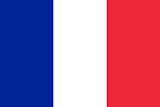
Siamesische Truppen paradieren an der Weltkriegssiegesfeier in Paris.
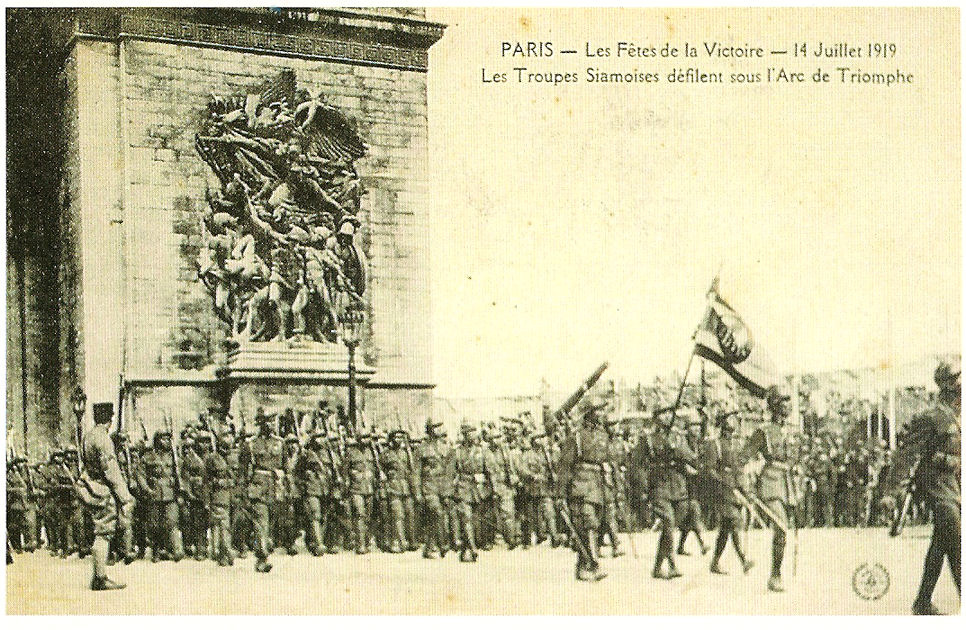
Abb.: Siamesische Truppen bei den Weltkriegssiegesfeiern, Arc de Triomphe,
Paris, Postkarte, 1919-07-14
Abb.: Lage des Arc de Triomphe
[Bildquelle: OpenStreetMap. -- Creative Commons Lizenz (Namensnennung, share alike)]
"Seine volle Stärke erreichte der Siegestaumel am 14. Juli 1919: Am Tag nach der Unterzeichnung des Vertrages, der die Niederlage Deutschlands festschrieb, feierte ganz Frankreich den Sieg und sonnte sich in seinem Ruhm. Abordnungen der Kampfverbände und Delegationen aller ausländischen Armeen, die dem unsterblichen Frankreich die Huldigung seiner Verbündeten und der Welt überbrachten, marschierten hinter den drei großen Heerführern durch den Arc de Triomphe, der seine Benennung zum ersten Mal zu Recht führte, denn bisher hatte er nur der Verherrlichung Victor Hugos [1802 - 1885] gedient. Die drei Oberbefehlshaber, deren Namen jedermann im Munde führte und die Seite an Seite den Zug zu Pferde anführten, waren Marschall Foch [Ferdinand Foch, 1851 - 1929], der Oberkommandierende aller alliierten Armeen, General Joffre [Joseph Jacques Césaire Joffre, 1852 - 1931], der Sieger der Marne-Schlacht, und Marschall Pétain [Henri Philippe Benoni Omer Joseph Pétain, 1856 - 1951], der Held von Verdun, dem Millionen von Poilus [Frontsoldaten] das Ende unnötiger und blutiger Offensiven verdankten. An diesem Tag genossen alle Franzosen die Genugtuung der Revanche und gedachten in ehrender Weise der zähen Tapferkeit des Infanteristen, der ausdauernden Beharrlichkeit des Bauern und der inneren Geschlossenheit eines ganzen Volkes, das siegreich aus der härtesten und längsten Prüfung seiner Geschichte hervorgegangen war." [Quelle: Rémond, René <1918 - >: Frankreich im 20. Jahrhundert. -- Erster Teil 1918 - 1958. -- Stuttgart : DVA, 1994. -- 635 S. ; 23 cm. -- (Geschichte Frankreichs ; 6,1). -- ISBN 3-421-06456-3. -- Originaltitel: Notre siècle de 1918 á 1991 (1991). -- S. 27f. -- Fair use]
1919-07-19

Siamesische Truppen paradieren an der Weltkriegssiegesfeier in London.
1919-07-22

Siamesische Truppen paradieren an der Weltkriegssiegesfeier in Brüssel (Belgien).
1919-08-17
Randale beim Fußballspiel Royal Pages (มหาดเล็กหลวง) gegen Naval Cadets (นายเรือ). Jeder Minute gibt es ein Foul. Die Kadetten spielen "like a band of hooligans". Die Zuschauer stürmen das Feld. Der Schiedsrichter bricht das Spiel ab. Daraufhin werfen die Zuschauer Ziegel und Steine. Mehrere Verletzte inklusive dem Schiedsrichter.
1919-08-18
Krungthep Daily Mail (กรุงเทพเดลิเมล์) meldet, dass in es Surat Thani (สุราษฎร์ธานี) um den Marktplatz zahlreiche registrierte und unregistrierte Prostituierte gibt.
Abb.: Lage von Sura Thani (สุราษฎร์ธานี)
[Bildquelle: OpenStreetMap. -- Creative Commons Lizenz (Namensnennung, share alike)]
1919-08-19

Bangkok Times zu der Bedeutung der Zuneigung des Königs zu einem Fußballteam für den Ausgang des Spiels:
"Certain teams are specially favoured in obtaining players, and . . . against these teams certain other teams are not allowed to play their best." [Bangkok Times. -- 1919-08-19. -- Zitiert in: Vella, Walter F. <1924 - 1980>: Chayo! : King Vajiravudh and the development of Thai nationalism / Walter F. Vella, assisted by Dorothy B. Vella. -- Honolulu : Univ. Press, 1978. -- 347 S. : Ill. ; 25 cm. -- ISBN 0-8248-0493-7. -- S. 303, Anm. 96.]
1919-09-02

Ein japanischer Mitarbeiter der Dampfergesellschaft Yamashita & Co. nimmt geheime Kontakte mit der Regierung Siams auf, um diese zur Gründung einer eigenen Dampfschiffgesellschaft zu bewegen, damit das Handelsmonopol Großbritanniens gebrochen wird. Wenn Siam zustimme, bringe ihm das die Umwandlung der ungleichen Verträge mit Japan in gleichberechtigte Verträge. Das ganze verläuft sich.
1919-09-10

Friedensvertrag von Saint-Germain mit Österreich - Für Siam unterzeichnet Prinz Charoon (พระวรวงศ์เธอ พระองค์เจ้าจรูญศักดิ์กฤดากร, 1875 - 1928, Botschafter in Paris).
Abb.: Lage von Saint-Germain-en-Laye
[Bildquelle: OpenStreetMap. -- Creative Commons Lizenz (Namensnennung, share alike)]
Abb.: Neuordnung Europas durch die Friedensverträge
[Bildquelle: Fluteflute / Wikimedia. -- Creative Commons Lizenz (Namensnennung, share alike)]
1919-09-20

Tod von Luang Po Ngoen (หลวงพ่อเงิน, geb. 1810), Wat Bangklan (วัดบางคลาน), Amphoe Pho Thale (โพทะเล), Provinz Phichit (พิจิตร)
)(
Abb.: Luang Po Ngoen (หลวงพ่อเงิน)
Abb.: Lage von Wat Bangklan (วัดบางคลาน)
[Bildquelle: OpenStreetMap. -- Creative Commons Lizenz (Namensnennung, share alike)]
1919-09-21 - 1919-09-23
Abb.: Rama VI. empfängt die aus Frankreich zurückkehrenden siamesischen Soldaten
[Pressefoto Agence Rol, 1919]Rückkehr der restlichen 800 siamesischen Kriegshelden. Weltkriegssiegesfeier in Bangkok.
1919-09-21

Der militaristische buddhistische Sangharaja (สังฆราช), Vajirañāṇavarorasa (วชิรญาณวโรรส, 1880 - 1921), begrüßt die zurückgekehrten Weltkriegstruppen,. Er lobt sie, dass sie den Alliierten geholfen haben, das Recht zu verteidigen und den Sieg der Unmoral zu verhindern. Sie hätten der Thai-Nation Stolz bereitet. Dann segnet er sie im Namen Buddhas.
1919-09-24

Rama VI. beerdigt die Aschenurnen der 19 im Weltkrieg gestorbenen Thai-Soldaten am Volunteer Soldier's Monument (อนุสาวรีย์ทหารอาสา).
Abb.: Volunteer Soldier's Monument (อนุสาวรีย์ทหารอาสา), 1919-09-24
Abb.: Lage des Volunteer Soldier's Monument (อนุสาวรีย์ทหารอาสา)
[Bildquelle: OpenStreetMap. -- Creative Commons Lizenz (Namensnennung, share alike)]Gamäß den Inschriften am Monument sind die Soldaten an folgenden Orten gestorben:
Bangkok 2 Jubécourt 1 Châlons-sur-Marne 1 Paris 5 Avord 1 Marseilles 1 Neustadt an der Weinstraße 4 Mussbach 1 Geinsheim (Neustadt an der Weinstraße) 1 Landau (Pfalz) 1 Godramstein (Landau, Pfalz) 1 [Datenquelle: Whyte, Brenda ; Suthida [สุทิดา] Whyte: The inscriptions on the First World War volunteers memorial, Bangkok. -- In: Journal of the Siam Society. -- 96 (2008). -- S. 184]
1919-09-24
"Junius" in Bangkok Times:
"The first article by Junius, for example, stressed the theme that, now that "Siam has taken her place in the family circle of the nations," Siam must live up to the responsibilities of that position. Siam must develop its resources to prevent the growth of a "spirit of unrest" internally and to answer the threat of the irresistible force outside that demanded "higher development." To develop its potential Siam needed honest and able administrators and not "her common run" of men better known for "paltry cleverness" than "straightforward work." Siam needed also to throw open its gates to foreign business and to Chinese labor. Siam must invest in its own development, and to do this must "cease to dissipate her resources on armaments." Waste of all sorts must end, particularly "private profit arising out of government acts, nepotism and the power of personal influence." The article concluded: "Siam needs a strong leader. She has him, if he will trust himself and the right helpers." [Bangkok Times. -- 1919-09-24. -- In: Vella, Walter F. <1924 - 1980>: Chayo! : King Vajiravudh and the development of Thai nationalism / Walter F. Vella, assisted by Dorothy B. Vella. -- Honolulu : Univ. Press, 1978. -- 347 S. : Ill. ; 25 cm. -- ISBN 0-8248-0493-7. -- S. 266]
1919-10
Grippe-Epidemie in ganz Siam.
Abb.: Grippe-Symptome
[Bildquelle: CDC / Wikipedia. -- Public domain]
1919-10-03

Rama VI. verkündet, dass er vorhat 22.000 m² privaten Landbesitzes des Königs in Bangkok für einen öffentlichen Park zu spenden. Der Park soll Lumphini-Parks (สวนลุมพินี) heißen nach Lumbini (लुम्बिनी), dem Geburtsort Gotama Buddhas.
Abb.: Lage des Lumphini-Parks (สวนลุมพินี)
[Bildquelle: OpenStreetMap. -- Creative Commons Lizenz (Namensnennung, share alike)]
Abb.: Plan des Lumphini-Parks (สวนลุมพินี)
[Bildquelle: Roger Price. -- http://www.flickr.com/photos/rwp-roger/5601273007/. -- Zugriff am 2011-11-13. -- Creative Commons Lizenz (Namensnennung)]
"Der Lumphini-Park (Thai สวนลุมพิน, andere Schreibweise: Lumpini, Lumpeenee) ist der größte Park im Zentrum von Bangkok, der Hauptstadt von Thailand. Er liegt im Bezirk Pathum Wan (ปทุมวัน) und bildet selbst einen Unterbezirk (Kwaeng - แขวง) dieses Stadtteils. Lage und Gestaltung
Der Park umfasst etwa 360 Rai (ไร่; 576.000 Quadratmeter).
Der Park ist ummauert und enthält einen künstlichen See, der mit mietbaren Ruder- und Tretbooten befahren werden kann. Auch ein 2,5 Kilometer langer Trimm-Dich-Pfad mit vielen Geräten ist vorhanden, neben Hüpfhindernissen zum Beispiel auch Hanteln. Er bildet einen der wenigen Orte, an dem noch heute berittene Polizisten patrouillieren.
Die beste Besuchszeit ist am frühen Morgen vor 7 Uhr, wenn in der morgendlichen Kühle von den einheimischen Chinesen Tai Chi (太極拳) geübt wird. Wenn kurz vor Sonnenuntergang am Abend die Hitze wieder erträglich ist, wird von vielen Einwohnern der Umgebung unter Anleitung eines Vorturners mit flotter Musik Aerobic trainiert.
Im Winter werden im Palmengarten des Parks öffentliche Konzerte im Rahmen des „Concert in the Park“ aufgeführt, das unter anderem vom Bangkoker Sinfonieorchester gestaltet wird.
GeschichteDer Lumphini-Park wurde in den Zwanziger Jahren von König Vajiravudh (Rama VI.) auf königlichem Grundbesitz geschaffen. Eine Statue des Königs steht auch am südwestlichen Eingang zum Park; sie wurde am 27. März 1942 entschleiert[1]. Das Gelände ist nach Lumbini, dem Geburtsort Buddhas in Nepal, benannt. Zur Zeit seiner Gründung lag der Park am Außenrand der Hauptstadt. Heute liegt er in der Innenstadt im belebtesten Geschäftsbezirk Bangkoks an der Nordseite der Rama-IV-Straße zwischen der Ratchadamri- und Witthayu-Straße („Wireless Road“), und wird täglich von zahlreichen Menschen aufgesucht.
Hier befand oder befindet sich die erste öffentliche Bibliothek Bangkoks und der erste öffentliche Tanzsaal.
LiteraturEinzelnachweise
- Thailand. The National Geographic Traveler. 2001, S. 97.
- Wadee Kheourai: Around Thailand in 99 Days : English for Tourism. Bangkok 1999. S. 31"
[Quelle: http://de.wikipedia.org/wiki/Lumphini-Park. -- Zugriff am 2011-11-13]
1919-10-07




Weltpolitische Betrachtungen Prinz Charoon's (gest. 1928) gegenüber Rama VI.:
"In general, however, Siamese foreign policy continued to reflect the view, as expressed by Prince Charoon, that "the English will be masters of the World" and that "We, a small country on her borders are bound to be drawn closer into her orb." Charoon argued that there was no power "sufficiently strong to counteract the centrifugal force" of Britain. France, he wrote, was too weak, and the only other alternatives were the United States, whose interest was doubtful, and Japan. Charoon concluded, interestingly: "Of the two I need hardly say which would be preferable."" [Quelle: Vella, Walter F. <1924 - 1980>: Chayo! : King Vajiravudh and the development of Thai nationalism / Walter F. Vella, assisted by Dorothy B. Vella. -- Honolulu : Univ. Press, 1978. -- 347 S. : Ill. ; 25 cm. -- ISBN 0-8248-0493-7. -- S. 299, Anm. 191]
1919-10-10
Bangkok Times über das Kino Nakhon Kasem (นครเกษม), ein "pionier in ferro-concrete cinema buildings in Siam". Baukosten über 220.000 Baht:
"For the painting of the walls and stage scenery the services of prominent members of the Fine Arts Department have been secured. . . . The ornamentation of the screen was designed by HRH Prince Nares [Naret] [Nares Varariddhi - พระเจ้าบรมวงศ์เธอ กรมพระ: นเรศวรฤทธิ์, 1855 - 1925]. The theater is able to accommodate comfortably 1,500 persons, with still plenty of room available before the stage of crowding is reached. The main seating accommodation is on the second floor with a raised platform at the rear for boxes and first and second-class seats. There is a balcony right around the hall and tables placed at convenient distances so as to allow those who wish to enjoy both drinks and cinema pictures at one and the same time to have their privilege. In all there are about 600 electric lamps which illuminate the interior and exterior of the hall. There are two electric dynamos which are worked by the Siam Electricity Company’s current . . . there are six approaches to the hall and each gateway is brightly illuminated. Cars need not line up on either New Road [Charoen Krung Road - ถนนเจริญกรุง], Chakravadi Road [ถนนจักรวรรดิ] or Yawarad Road [Yaowarad Rd. / ถนนเยาวราช / 耀華力路] because there is quite ample room for vehicles to safely line up in the roadways around the hall. There are some three stairways leading [into the theater]—two to the one-saleung [สลึง = ¼ Baht] and two-saleung seats, and one to the first, second and third class seats. Besides the bar there is a billiards room and there is going to be a sort of cave in the center of the hall, illuminated with electric bulbs, where girls will sell refreshments."
[Zitiert in: Barmé, Scot: Woman, man, Bangkok : love, sex, and popular culture in Thailand. -- Lanham : Rowman & Littlefield, 2002. -- 273 S. : Ill. ; 24 cm. -- ISBN 0-7425-0157-4. -- S. 62f., Anm. 24]
1919-10-13
Paris: Convention Relating to the Regulation of Aerial Navigation. Siam gehört zu den ersten Signatarmächten.
"The international use of aircraft brought up questions about air sovereignty. The arguments over air sovereignty at the time factored into one of two main viewpoints: either no state had a right to claim sovereignty over the airspace overlying its territory, or every state had the right to do so.[2] The Paris Convention of 1919 sought to determine this question as part of the process of framing the convention's assumptions, and it was decided that each nation has absolute sovereignty over the airspace overlying its territories and waters.
[...]
The following principles governed the drafting of the convention:[3]
- Each nation has absolute sovereignty over the airspace overlying its territories and waters. A nation, therefore, has the right to deny entry and regulate flights (both foreign and domestic) into and through its airspace.
- Each nation should apply its airspace rules equally to its own and foreign aircraft operating within that airspace, and make rules such that its sovereignty and security are respected while affording as much freedom of passage as possible to its own and other signatories' aircraft.
- Aircraft of contracting states are to be treated equally in the eyes of each nation's law.
- Aircraft must be registered to a state, and they possess the nationality of the state in which they are registered."
[Quelle: http://en.wikipedia.org/wiki/Paris_Convention_of_1919. -- Zugriff am 2013-12-18]
1919-10-20

Tod von Königin Saovabha Phongsri (สมเด็จพระศรีพัชรินทราบรมราชินีนาถ พระบรมราชชนนีพันปีหลวง, 1864 - 1910)
Abb.: Rama V. und Königin Saovabha Phongsri (สมเด็จพระศรีพัชรินทราบรมราชินีนาถ พระบรมราชชนนีพันปีหลวง)
[Bildquelle: Wikimedia. -- Public domain]
1919-11 - 1921-06
Das 1919-06 verhängte Exportverbot für Reis sowie Missernten führen zu Devisenproblemen. Deshalb stoppt die Regierung die Ausgabe von Baht, rationiert die Ausgabe von Sterling an die Banken und erhöht die Umtauschrate für ein Pfund-Sterling von 13 Baht auf 14 Baht.
1919-11-12
"Mom Chao Bovordej's [Boworadet (พระวรวงศ์เธอ พระองค์เจ้าบวรเดช), 1877 - 1953] Observations":
"It is a fact that to all practical intents and purposes, the administration expends almost its entire energy in three ways: first and foremost, in correspondence and clerical labor; secondly, in the collection of taxes; and thirdly, in the tracking down of criminals and the punishment of crime, with but moderate success it is true, but still with every endeavor and effort. Other activities in as far as concerns the mass of the population, such as education, public and health works, etc. amount I would say to at most 10 percent if that; and these are obtained largely by the payment of the people, unavoidable to them, either in money, or kind, or labor. Small wonder that they are dissatisfied and suspicious of new measures." [Zitiert in: Greene, Stephen Lyon Wakeman: Absolute dreams : Thai government under Rama VI, 1910-1925. -- Bangkok : White Lotus, 1999. -- 224 S. ; 22 cm. -- ISBN 974-8434-69-9. -- S. 146]
1919-11-12 - 1919-12-10


Erster Flug von Großbritannien nach Australien in knapp 28 Tagen. Route: Hounslow Heath - Lyon - Rom - Kairo - Damaskus - Basra - Karachi - Delhi - Kalkutta - Akyab - Rangoon - Singora (Songkhla - สงขลา) (ungeplant, wegen starken Regens) - Singapur - Batavia (Jakarta) - Surabaya - Darwin
Abb.: Das Flugzeug des Erstflugs Großbritannien - Australien: Vickers Vimy biplane, 1919
[Bildquelle: Wikipedia. -- Public domain]
1919-11-15
Phraya Nonthisen (Maek Sinasewi) [พระยานนทิเสนสุเรนทรภักดี (แม็ค เศียนเสวี)], Chef des Personals des Wild Tiger Scout Corps (จัดตั้งกองเสือป่า) ruft in der Zeitschrift Dusit Samit (ดุสิตสมิต) zu Spenden zur Anschaffung von Gewehren für das Corps auf:
Abb.: Phraya Nonthisen (Maek Sinasewi) [พระยานนทิเสนสุเรนทรภักดี (แม็ค เศียนเสวี)] / Zeichnung von Rama V.
"Weapons are crucial in achieving victory in warfare nowadays. Since we don’t manufacture firearms ourselves we have to purchase them from foreign countries, and this requires money. Our leader, His Majesty the King, has given his personal fortune to assist the development of the Corps, but this is not enough. I must urgently beseech you to support the Wild Tigers with your contribution." [Übersetzung: Greene, Stephen Lyon Wakeman: Absolute dreams : Thai government under Rama VI, 1910-1925. -- Bangkok : White Lotus, 1999. -- 224 S. ; 22 cm. -- ISBN 974-8434-69-9. -- S. 139f.]
1919-11-20
Siams Botschafter in Frankreich rät Rama VI. von einem Besuch in Europa ab:
"Such a visit may be made a lever to obtain some advantage from us. This danger is very persistent in my mind, for there has already been a precedent in the case of His late Majesty. On the eve of his departure a demand was made to Him for the secret treaty in the Malay Peninsula. I have a feeling that only an opportunity is sought to present the same demand again." [Zitiert in: Vella, Walter F. <1924 - 1980>: Chayo! : King Vajiravudh and the development of Thai nationalism / Walter F. Vella, assisted by Dorothy B. Vella. -- Honolulu : Univ. Press, 1978. -- 347 S. : Ill. ; 25 cm. -- ISBN 0-8248-0493-7. -- S. 80]
1919-11-27
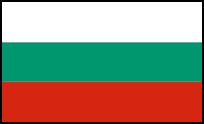
Friedensvertrag von Neuilly-sur-Seine mit Bulgarien (Царство България) - Für Siam unterzeichnet Prinz Charoon (พระวรวงศ์เธอ พระองค์เจ้าจรูญศักดิ์กฤดากร, 1875 - 1928, Botschafter in Paris).
Abb.: Lage von Neuilly-sur-Seine
[Bildquelle: OpenStreetMap. -- Creative Commons Lizenz (Namensnennung, share alike)]
Abb.: Neuordnung Europas durch die Friedensverträge
[Bildquelle: Fluteflute / Wikimedia. -- Creative Commons Lizenz (Namensnennung, share alike)]
1919-12
Da während der regenzeit der Monsun ausgefallen ist, ist die Reisernte sehr schlecht. Deswegen totales Exportverbot für Reis. Erstmals seit 1850 importiert Siam mehr Güter als es ewxportiert.
1920-01 - 1923-4
In Nan (น่าน) werden 156 Personen von Tigern getötet. Der Fürst von Nan setzt eine Belohnung für das Töten von Tigern aus, daraufhin werden 36 Tiger getötet und die Tiger-Gefahr ist beseitigt.
Abb.: Lage von Nan (น่าน)
[Bildquelle: OpenStreetMap. -- Creative Commons Lizenz (Namensnennung, share alike)]
1920-01-01
Eröffnung der Bahnstrecke bis Chiang Mai (เชียงใหม่).
Abb.: Bahnstrecke nach Chiang Mai (เชียงใหม่)
[Bildquelle: OpenStreetMap. -- Creative Commons Lizenz (Namensnennung, share alike)]
Abb.: Eisenbahnbrücke bei Chiang Mai (เชียงใหม่), Postkarte, um 1920
1920-01-03
Mädchen bis zum Alter von 12 Jahren dürfen an staatliche Knabenschulen.
1920-01-10

Royal Proclamation permitting trade with Germany
"Now therefore we do hereby proclaim that as from the 10th day of January B. E. 2462, trade is permitted to be carried on by Siamese subjects whereever they reside and other persons residing in Siam with German nationals or subjects and persons residing in any of the German States..." [Zitiert in: Catthiyakorn Sasitharamas [คัททิยากร ศศิธรามาส]: Die deutsch-thailändischen Beziehungen in der Zeit der Weimarer Republik bis zum Ende des Zweiten Weltkriegs. -- Hamburg : Kovač, 2012. -- 346 S. ; 21 cm. -- (Schriftenreihe Schriften zur Geschichtsforschung des 20. Jahrhunderts ; Bd. 4). -- ISBN 978-3-8300-6361-2. -- Zugl.: Hamburg, Univ., Diss., 2012. -- S. 34, Anm. 11]
1920-01-14


Bildung eines selbstständigen Department für buddhistische Religionsangelegenheiten, das dem König direkt entsteht. Dadurch wird das Unterrichtsministerium rein säkular. Das neue Department ist für die Registrierung und Disziplinierung des buddhistischen Klerus zuständig.
1920-01-17

Per königlichem Dekret wird allen Deutschen für die Dauer von drei Jahren die Einreise nach Siam verboten. Das Einreiseverbot wird nach seinem Ablauf bis "zum Inkrafttreten eines Siam befriedigenden Abkommens mit Deutschland" verlängert
1920-02-03
Krungthep Daily Mail (กรุงเทพเดลิเมล์ ) meldet dass es in Phitsanulok (พิษณุโลก) zahlreiche (illegale) Bordelle gibt.
Abb.: Lage von Phitsanulok (พิษณุโลก)
[Bildquelle: OpenStreetMap. -- Creative Commons Lizenz (Namensnennung, share alike)]
1920-02-03 - 1927-05-05

Sir Laurence Nunns Guillemard (1862–1951) ist British High Commissioner in Malaya
Abb.: Sir Laurence Nunns Guillemard
[Bildquelle: Wikimedia. -- Public domain]
1920-02-07

Rama VI. erwägt, einen Staatsbesuch in Japan zu machen. Ein solcher kommt dann doch nicht zustande.
1920-02-24

Gründung der Nationalsozialistischen Deutschen Arbeiterpartei (NSDAP) durch Umbenennung der Deutschen Arbeiterpartei. Parteivorsitzender ist von 1921 bis 1945 Adolf Hitler (1889 - 1945)
Abb.: Plakat für einen Vortrag von Adolf Hitler "Was wir wollen?", München, 1920-05-11
1920-03-15
Der Canton Shrine (Thong Ching Thang) (ศาลเจ้ากวางตุ้ง (ถงจิ้งถัง)) wird als Heiligtum registriert. 1880 hatten sich aus Kanton (廣州) stammende Chinesen zusammengetan, um einen Schrein aus lauter aus China stammendem Material zu bauen.
Abb.: Chinesische Neujahrfeier, Canton Shrine (Thong Ching Thang) (ศาลเจ้ากวางตุ้ง (ถงจิ้งถัง)), 2011
[Bildquelle: Gerry Popplestone. -- http://www.flickr.com/photos/50058453@N00/5412824056. -- Zugriff am 2013-09-03. -- Creative Commons Lizenz (Namensnennung, keine kommerzielle Nutzung, keine Bearbeitung)]
ausführlich: http://www.payer.de/thailandchronik/ressourcen.htm
Directory for Bangkok and Siam 1914. -- Bangkok : Bangkok Times, 1914. -- 380, 155 S. : Ill. ; 23 cm.
Vella, Walter F. <1924 - 1980>: Chayo! : King Vajiravudh and the development of Thai nationalism / Walter F. Vella, assisted by Dorothy B. Vella. -- Honolulu : Univ. Press, 1978. -- 347 S. : Ill. ; 25 cm. -- ISBN 0-8248-0493-7
Phongpaichit, Pasuk <ผาสุก พงษ์ไพจิตร, 1946 - > ; Baker, Chris <1948 - >: Thailand : economy and politics. -- Selangor : Oxford Univ. Pr., 1995. -- 449 S. ; 23 cm. -- ISBN 983-56-0024-4. -- Beste Geschichte des modernen Thailand.
Ingram, James C.: Economic change in Thailand 1850 - 1870. -- Stanford : Stanford Univ. Pr., 1971. -- 352 S. ; 23 cm. -- "A new edition of Economic change in Thailand since 1850 with two new chapters on developments since 1950". -- Grundlegend.
Akira, Suehiro [末廣昭] <1951 - >: Capital accumulation in Thailand 1855 - 1985. -- Tokyo : Centre for East Asian Cultural Studies, ©1989. -- 427 S. ; 23 cm. -- ISBN 4896561058. -- Grundlegend.
Skinner, William <1925 - 2008>: Chinese society in Thailand : an analytical history. -- Ithaca, NY : Cornell Univ. Press, 1957. -- 459 S. ; 24 cm. -- Grundlegend.
Mitchell, B. R. (Brian R.): International historical statistics : Africa and Asia. -- London : Macmillan, 1982. -- 761 S. ; 28 cm. -- ISBN 0-333-3163-0
Kludas, Arnold <1929 - >: Die Seeschiffe des Norddeutschen Lloyd 1857 bis 1970. -- Augsburg : Bechtermünz, 1998. -- 165 + 168 S. : Ill ; 28 cm. -- ISB 3-86047-262-3. -- Standardwerk.
Credner, Wilhelm <1892 - 1948>: Siam das Land der Tai : eine Landeskunde auf Grund eigner Reisen und Forschungen. -- Stuttgart : Engelhorn, 1935. -- 423 S. : Ill.
Bechert, Heinz <1932 - 2995>: Buddhismus, Staat und Gesellschaft in den Ländern des Theravāda-Buddhismus. -- Bd. 3: Bibliographie, Dokumente, Index. -- Wiesbaden : Harassowitz, ©1973. -- (Schriften des Instituts für Asienkunde in Hamburg ; XVII/3).
Barmé, Scot: Woman, man, Bangkok : love, sex, and popular culture in Thailand. -- Lanham : Rowman & Littlefield, 2002. -- 273 S. : Ill. ; 24 cm. -- ISBN 0-7425-0157-4
Zu Chronik B. E. 2463 / 1920-04 - 1921-03